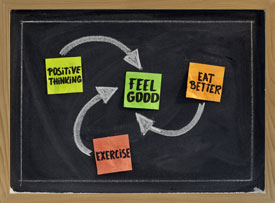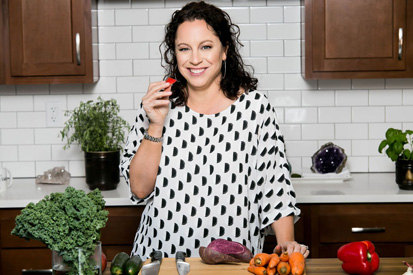By Liz Abel, LDN, CNS, MS, MA
 Here’s what we know about fad diets: they have a shelf life. They work for a period of time – as long as you are following the protocol – but as soon as you return to normal life, the symptoms that the fad diet had eradicated return. It’s a vicious, cyclical process, yet we’re always thinking “this time it will be different; this time it will work.”
Here’s what we know about fad diets: they have a shelf life. They work for a period of time – as long as you are following the protocol – but as soon as you return to normal life, the symptoms that the fad diet had eradicated return. It’s a vicious, cyclical process, yet we’re always thinking “this time it will be different; this time it will work.”
So, are there are any fad diets that work? Since most fad diets are directly geared to helping you lose weight, the answer is, yes, in the short term, you will meet your goals. In the long term, however, the fad diet starves your body of the minerals and vitamins it needs and typically creates additional stress (because you aren’t already stressed out enough!). Usually these diet plans are so prescriptive and restrictive that you continue to eat the same (boring) limited foods on a regular basis.
However, there is a silver lining to this fad-diet approach: you might try a new food, learn how to cook a new dish or two, or spend more time in the kitchen. On the flip side, you might be obsessed about every morsel of food, or find yourself placing more restrictive food rules on yourself, or — and the recent literature suggests this to be true — that binge behavior may follow.
The approach to a fad diet is “if I work really hard now, I’ll achieve my goals.” Which may be true, especially if your goals are weight loss. But if your goals also include improving your sleep, increasing your energy, eliminating your belly woes, going to the bathroom easily and regularly, eliminating headaches or joint pain, or more, then the fad diet your neighbor is doing probably isn’t in your best interest.
Let me paint you a picture.
As an example, if you are 40 years old today, you may still have more than 40,000 meals to eat in your lifetime. How many more almonds, avocados and coconut can you really take? How many powdered shakes and bars are you willing to consume? How many more tasteless salads can you stomach? How many more rules can you follow? Instead, if you have 40,000 meals ahead of you, wouldn’t it be simpler to focus on what you can do (versus what you shouldn’t do)? Wouldn’t you like to eat the foods that are right for you? Wouldn’t you like to expand your repertoire of eating healthy, interesting foods that nourish your body?
In a society of instant gratification and satisfaction, brain chemistry altering foods (hello sugar and MSG), and social media that promotes (and shames) the size of your waist, it’s not always easy to shift your perspective of “I want/have to lose weight now!” to “what do I want to gain in my health?”
But I encourage you to take a “what do I want to gain” approach to your health. To get started, I offer you these general tips. Do not underestimate the power of these simple tips. We will be discussing the “why” behind them over on our social media platforms throughout the spring.
1. Drink water. Start with 20 ounces upon waking. And then sip throughout the day. Drink only 6 ounces of liquid with any meal. Don’t drink water so late into the evening that it disrupts your sleep. Every body requires a different amount of water, but a good starting point is 75 ounces for women and 95 ounces for men.
2. Do not multi task when you eat. Put down the phone, close the laptop, turn off the TV. Eat at a proper table (the coffee table is not one). Take a few deep breaths, and give gratitude for your food. Consider where it comes from and who helped grow it, make it and get it to the grocery store.
3. Eat at the same time every day. And sit on the toilet at the same time every day. It’s true: all of us (including our dogs!) prefer a set schedule. Train the body and your digestive ability will amplify and your gastrointestinal system will be happy!
4. Opt for warming leftovers on the stovetop or oven (rather than the microwave). An important part of the digestive process begins 20-30 minutes before we eat. But when we nuke something in two minutes, the body hasn’t had a chance to receive the “hey, I’m about to eat” signals. By releasing the smells for 10-15 minutes before you begin to eat, you’ll give your digestive system a head start.
5. Every week find a new vegetable (even if it’s only an herb, as these are small but very mighty) and learn how to cook or use it. Adults need to eat something 4-7 times before you can assess if you truly like (or dislike) a food. (Kids need 7-10 times.) So stick with it. Continue to be adventurous and if it turns out that you truly don’t like Brussel sprouts, no problem. You may have learned that you love swiss chard and Bok choy in the process.
6. Consider chiropractic, acupuncture and massage to ensure your nervous system runs smoothly. Keeping your bones, joints and energy aligned allows your body and mind to function in synchronicity, and in turn, supports the proper digestion and utilization of your food. You will not only move better, but will feel better, heal better, think better and make better choices!
7. Is your food safe for you? Despite eating ‘healthy’ food, hidden delayed food and chemical sensitivities may be contributing to chronic inflammation. If unaddressed, this burden on your immune system may build, causing frustrating symptoms such as sleep disturbances, digestive issues, weight and hormonal imbalance, mood/behavior disruptions, joint pain, skin issues, and more. By identifying your triggers, and avoiding exposure, the effects can be reduced or even eliminated. Micronutrient, stool and hormone testing can also help identify what your body specifically needs for optimal function.
If you feel like you’ve ‘tried everything,’ yet still don’t feel well, consider a functional approach to your nutrition—one that seeks the root cause of your suffering, without masking symptoms with medication. A comprehensive review of your physical, emotional and chemical status will help you—finally!—identify and restore balance and vitality.
As seen in Living Well magazine

Liz Abel, LDN, CNS, MS, MA, is a Licensed Integrative Nutritionist at the First State Health & Wellness Integrative Health Center. She leads a dynamic, team-based Functional Nutrition program that encompasses food, lifestyle, lab testing, natural supplementation, mindfulness and movement to support your health and well-being.
Integrated with First State’s six chiropractic offices, the program offers access to Delaware’s premiere experts in holistic health. Are you ready to create your custom plan and harness sustainable results? Call 302.384.7104 or e-mail Wellness@FirstStateHealth.com to schedule your comprehensive Functional Nutrition consultation today.
